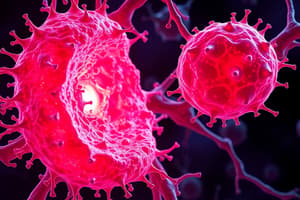Podcast
Questions and Answers
What local effect can benign neoplasms have on surrounding tissues?
What local effect can benign neoplasms have on surrounding tissues?
- Compression causing pressure atrophy (correct)
- Intravenous infiltration
- Complete tissue destruction
- Metastatic spread
Which of the following is a common systemic effect of neoplasms?
Which of the following is a common systemic effect of neoplasms?
- Anaemia (correct)
- Leukocytosis
- Local inflammation
- Hyperplasia
Which neoplasm can cause ectopic hormone secretion?
Which neoplasm can cause ectopic hormone secretion?
- Benign meningioma
- Small cell carcinoma of bronchus (correct)
- Hepatoma
- Leiomyoma
Which effect is specifically associated with malignant neoplasms?
Which effect is specifically associated with malignant neoplasms?
What is a potential consequence of raised intracranial pressure (ICP) due to neoplasms?
What is a potential consequence of raised intracranial pressure (ICP) due to neoplasms?
Which symptom is indicative of cachexia associated with neoplasms?
Which symptom is indicative of cachexia associated with neoplasms?
Neuromuscular issues related to neoplasms may include which of the following?
Neuromuscular issues related to neoplasms may include which of the following?
What can result from the infiltration of the bone marrow due to neoplasms?
What can result from the infiltration of the bone marrow due to neoplasms?
What primarily causes the need for angiogenesis in a tumor?
What primarily causes the need for angiogenesis in a tumor?
Which of the following is NOT a route of metastasis?
Which of the following is NOT a route of metastasis?
Which type of carcinoma is commonly known to metastasize to the liver?
Which type of carcinoma is commonly known to metastasize to the liver?
What is a possible effect of metastasis to bone?
What is a possible effect of metastasis to bone?
Which of the following factors does NOT determine the effects of tumors?
Which of the following factors does NOT determine the effects of tumors?
Angiogenesis is primarily regulated by which of the following factors?
Angiogenesis is primarily regulated by which of the following factors?
What does the term 'primary tumor' refer to?
What does the term 'primary tumor' refer to?
What can result from vascular spread to the brain?
What can result from vascular spread to the brain?
What role do Matrix Metalloproteinases (MMPs) play in tumor cell behavior?
What role do Matrix Metalloproteinases (MMPs) play in tumor cell behavior?
Which of the following factors can potentiate the movement of cancer cells through the stroma?
Which of the following factors can potentiate the movement of cancer cells through the stroma?
Which of the following describes the ECM in relation to cancer invasion?
Which of the following describes the ECM in relation to cancer invasion?
What is the primary feature of metastasis in cancer cells?
What is the primary feature of metastasis in cancer cells?
Why do not all cancer cells that circulate successfully establish metastases?
Why do not all cancer cells that circulate successfully establish metastases?
What determines the organ distribution of metastases in relation to the primary tumor?
What determines the organ distribution of metastases in relation to the primary tumor?
Which chemokine receptor is associated with human breast cancer cells for metastasis?
Which chemokine receptor is associated with human breast cancer cells for metastasis?
What is the primary characteristic of malignant cells in terms of adhesion?
What is the primary characteristic of malignant cells in terms of adhesion?
What happens once tumor cells reach their target organ?
What happens once tumor cells reach their target organ?
What type of cancer is associated with the loss of E cadherin?
What type of cancer is associated with the loss of E cadherin?
Which of the following is a characteristic feature of metastasis?
Which of the following is a characteristic feature of metastasis?
What role do integrins play in cancer cell invasion?
What role do integrins play in cancer cell invasion?
What is one of the mechanisms facilitating invasion by malignant cells?
What is one of the mechanisms facilitating invasion by malignant cells?
Which factors contribute to the motility of malignant cells?
Which factors contribute to the motility of malignant cells?
How do malignant cells interact with the surrounding stroma?
How do malignant cells interact with the surrounding stroma?
What is the definition of invasion in the context of tumors?
What is the definition of invasion in the context of tumors?
Flashcards
Angiogenesis
Angiogenesis
The growth of new blood vessels, often triggered by a lack of nutrients or oxygen in the tumor's microenvironment.
Metastasis
Metastasis
The process of cancer cells spreading from the primary tumor site to other parts of the body.
Lymphatics
Lymphatics
The lymphatic system, a network of vessels that carries lymph fluid throughout the body and is a common route for cancer metastasis.
Vascular Spread
Vascular Spread
Signup and view all the flashcards
Vascular Spread to Lung
Vascular Spread to Lung
Signup and view all the flashcards
Vascular Spread to Liver
Vascular Spread to Liver
Signup and view all the flashcards
Vascular Spread to Bone
Vascular Spread to Bone
Signup and view all the flashcards
Vascular Spread to Brain
Vascular Spread to Brain
Signup and view all the flashcards
Matrix Metalloproteinases (MMPs)
Matrix Metalloproteinases (MMPs)
Signup and view all the flashcards
MMP2 and MMP9
MMP2 and MMP9
Signup and view all the flashcards
MMP1
MMP1
Signup and view all the flashcards
Cell Motility
Cell Motility
Signup and view all the flashcards
Autocrine Motility Factors
Autocrine Motility Factors
Signup and view all the flashcards
Organ Tropism
Organ Tropism
Signup and view all the flashcards
Extravasation
Extravasation
Signup and view all the flashcards
Invasion
Invasion
Signup and view all the flashcards
Altered Cell Adhesion
Altered Cell Adhesion
Signup and view all the flashcards
Cadherins
Cadherins
Signup and view all the flashcards
Integrins
Integrins
Signup and view all the flashcards
Altered Enzyme Synthesis
Altered Enzyme Synthesis
Signup and view all the flashcards
How do cells spread?
How do cells spread?
Signup and view all the flashcards
Primary vs. Secondary Tumor
Primary vs. Secondary Tumor
Signup and view all the flashcards
Local Effects of Benign Tumors
Local Effects of Benign Tumors
Signup and view all the flashcards
Tumors in Hollow Organs
Tumors in Hollow Organs
Signup and view all the flashcards
Space-Occupying Lesions
Space-Occupying Lesions
Signup and view all the flashcards
Local Effects of Malignant Tumors
Local Effects of Malignant Tumors
Signup and view all the flashcards
Hematological Effects of Tumors
Hematological Effects of Tumors
Signup and view all the flashcards
Endocrine Effects of Tumors
Endocrine Effects of Tumors
Signup and view all the flashcards
Ectopic Hormone Secretion
Ectopic Hormone Secretion
Signup and view all the flashcards
Cachexia
Cachexia
Signup and view all the flashcards
Study Notes
Neoplasia II: Invasion, Metastasis, and Effects of Tumors
- Invasion: Ability of cells to penetrate the basement membrane and spread through the stroma (extracellular matrix). Two key mechanisms:
- Spreading into surrounding tissue (Invasive Carcinoma).
- Entering lymphatic/vascular channels, characteristic of malignant cells.
Metastasis
- The spread of a malignant tumor to a distant (non-adjacent) site.
- A metastasis is also known as a secondary tumor, originating from the primary tumor.
Mechanisms of Cell Invasion and Spread
- Malignant cells have altered adhesion compared to normal cells, sticking less.
- Changes in enzyme production break down basement membranes and stroma.
- Motility factors help cells move.
- Malignant cells change their interaction with surrounding stroma.
Altered Cell Adhesion
- Cadherins: Calcium-dependent glycoproteins at cell membranes. Interact homotypically to bind cells together. Linked to the actin cytoskeleton via catenins. Reduced expression in cancer cells allows cells to separate. (Examples: esophagus, colon, breast, prostate cancers)
- Integrins: Cell surface glycoproteins with α and β subunits. Many biological functions (e.g., leukocyte and platelet adhesion). Receptors for different components of the basement membrane (e.g., fibronectin, collagen) . Reduced expression alters cell-stroma contact, facilitating cell movement.
Altered Enzyme Synthesis and Interaction
- Different enzymes modify the stroma, allowing cells to breach basement membranes and spread.
- Matrix metalloproteinases (MMPs) are zinc-dependent enzymes that degrade the extracellular matrix (ECM).
- MMP2 and MMP9 break down collagen IV.
- MMP1 breaks down collagen I.
- These changes in attachment alter tumor cell interactions with ECM proteins.
Cell Motility
- Disrupted basement membrane and stroma allow cells to move.
- Potentiated and directed by factors:
- Cell-derived motility factors (autocrine motility factors).
- Cleavage products of matrix proteins (e.g., laminin).
- Other ligands, such as Wnt5a (in melanoma).
- Increased expression of receptors for motility factors (e.g., Met oncogene, HGF receptor).
Metastasis Routes
- Lymphatics: Spread to local and distant lymph nodes; a frequent route for carcinomas; lungs can be involved.
- Blood vessels: Spread via capillaries and veins to other organs. Common sites include lungs, liver, bone, and brain.
- Coelemic spaces: Another pathway.
Importance of ECM
- The extracellular matrix (ECM, or stroma) isn't passive; it can promote or inhibit invasion.
- Malignant cells manipulate the ECM for facilitated passage (e.g., using growth, angiogenic, and chemotactic factors)
Why Don't All Malignant Cells Metastasize?
- Cells may invade and circulate but the environment might not be suitable.
- Incorrect receptor expression or metabolic factors may hinder their growth.
- Failure of angiogenesis can be another reason.
Angiogenesis
- Tumor growth halts beyond 1-2mm³ due to nutrient/oxygen depletion, altering the microenvironment.
- Upregulation of pro-angiogenesis factors (e.g., angiopoietin, VEGF) occurs, leading to new blood vessel growth.
- This growth enables continued tumor growth, providing access to the bloodstream.
- Thalidomide is a therapeutic target in renal cancers.
Definitions: Primary and Secondary Tumors
- Primary: The site where the malignant neoplasm first arises (e.g., breast, stomach).
- Secondary: A metastasis; a cancerous tumor that has spread to another organ (e.g., Breast carcinoma that spread to another organ).
Effects of Tumors
- Tumor effects depend on factors:
- Tumor site.
- Extent of local spread.
- Metastatic site.
- Extent of metastatic spread.
- Functional effects (e.g., pituitary).
Local Effects of Benign Neoplasms
- Compression (pressure atrophy).
- Altered function.
- Obstruction (hollow viscus).
- Erosion/ulceration.
- Space-occupying lesion.
Local Effects of Malignant Neoplasms
- Tissue destruction.
- Obstruction or constriction.
- Ulceration.
- Invasion and infiltration around nerves, blood vessels, and lymphatics.
- Space-occupying lesion.
Systemic Effects: Haematological
- Anemia (due to ulceration, bone marrow infiltration, or haemolysis).
- Low white blood cell and platelet counts (bone marrow infiltration).
- Thrombosis (e.g., pancreatic carcinoma).
Systemic Effects: Endocrine
- Excessive hormone secretion (benign and malignant endocrine glands).
- Ectopic hormone secretion (e.g., ACTH by small cell lung cancer).
Systemic Effects: Skin and Others
- Pigmentation changes.
- Herpes zoster.
- Jaundice.
- Dermatomyositis.
- Hodgkin's disease.
- Neuromuscular issues (e.g., balance problems, neuropathies, myopathy).
- Cachexia (weight loss).
- Malaise (general discomfort).
- Fever (pyrexia).
Why Neoplasms Kill People
- Local effects (raised intracranial pressure, perforation, hemorrhage).
- Replacement of essential body organs (bone marrow, lung, liver).
Studying That Suits You
Use AI to generate personalized quizzes and flashcards to suit your learning preferences.




